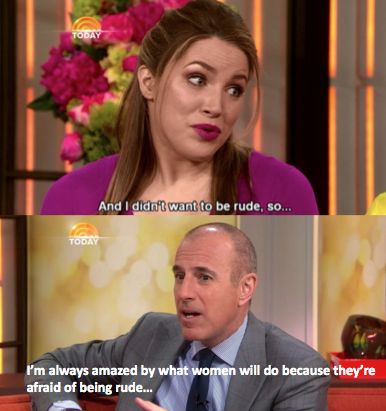|
I was never a fan of "motivational speakers" -- I have plenty of motivation, and when I listen to someone talk, it's because I want to laugh or learn.
But I stumbled upon an inspirational talk by author Brené Brown a few years ago, and it made me laugh and learn so much that I've listened to it at least once per year since. Listen to it -- I guarantee you'll at least crack a smile.
So good, right? It's humorous and relatable (for example, when I ran over my own cell phone, it only took a few milliseconds to "blame" my boyfriend -- after all, if he hadn't left his kayak in my parking spot, I wouldn't have opened the car door to move the kayak, so my phone wouldn't have fallen out, so I wouldn't have smooshed it).
And, unlike many inspirational or motivational talks, it talks a bit about the science. She doesn't just say, "Don't blame." She says why we blame, and why it's bad. "When something goes wrong, the first thing you want to know is, Whose fault is it?" she says. "I'd rather it be my fault than no one's fault -- because it gives us some semblance of control." It's true. Humans are inclined to blame, because our brains want to make sense of things. They really want to believe that things happen for a reason. This leads not only to blaming, but also to other weirdnesses. For example, we want to believe in a just world, where bad things happen to bad people. In one experiment, where participants were playing a game together and some were randomly assigned to be punished more than others... people stopped liking the participants who were punished more. They began attributing negative traits and associations to the unlucky few. Because our brains really want to believe that things happen for a reason. But sometimes... things happen for no reason at all. Nevertheless, when an unlucky lady spills her coffee, her brain scrambles to make sense of it. Brown continues: "Blame is simply this discharging of discomfort and pain. It has an inverse relationship with accountability. Accountability, by definition, is a vulnerable process. It means me calling you and saying, 'Hey, my feelings were really hurt about this,' and talking. Not blaming." The ability to tell someone, "Hey, I didn't like that," is hard. That's why I've written so much about why not to be passive aggressive, how to improve at saying no, and why most of the time, when you think you're being rude, you're actually just standing up to someone who is being rude. (And, of course, one of my favorite pro tips: Don't say no. Ask why.)
Brown points out that it's actually a lot easier to fume and think about whom to blame... than to practice accountability and have clear communication with others.
Plus, blaming is often a fruitless endeavor. Events are complicated, and there isn't always a clear culprit, as Sondheim beautifully illustrates in "Your Fault," from Into the Woods (I'm linking to the original Broadway cast instead of the Disney version, because it's wayyyyyyy better -- even though Anna Kendrick): (Also, can I just say, real quick: "It's his father's fault that the curse got placed, and the place got cursed in the first place." What a great chiasmus. I love Sondheim.) And sometimes.. blaming is completely unnecessary. As good as it might feel to explode at someone who just screwed up majorly... it feels even better to show compassion and forgiveness. Forgiveness isn't always easy... but it feels better than just about anything. I hate having to forgive... but I love forgiveness. For example. I was with a buddy, flying back to San Francisco from New York -- where, speaking of Broadway, I saw not only Nate Archibald's house, Chuck Bass's hotel, and the pond where Jenny Humphrey first became a drug dealer, but also the (or a?) wizard on Park and 73rd.
Life turned into an endless medley of "Gee, it had to be you!" Why?
For whatever reason, we decided to be responsible adults and show up at the airport an hour and a half before our flight, instead of mere minutes before it. At the airport, we decided to eat at a sports bar, where I would watch the basketball game and he would do some work on his computer -- and, since all of my electronics were dead, watch the time. He did not watch the time, and we ended up missing out flight by two minutes. He felt so horrible. He couldn't believe how stupid he'd been. I wasn't thrilled about staying an extra night in New York instead of getting home to my dog, either... but I felt bad that he felt bad. "It's seriously fine," I told him. "It's just what happens when you travel. Look -- we'll book an airport hotel, get a good night of sleep, and just fly home tomorrow. It'll be fun!" (See also: 7 Ways I'm WAY Healthier When I Travel Than When I'm At Home.) Seeing his guilt fade away as I joked, reassured, and prodded him to be silly with me filled me with joy, which is way better than... righteous wrath? Or whatever you feel when you blame. And, also, let's be real: it wasn't just his fault. Sure, he could have paid closer attention to the time... but I also could have found a place to charge my phone, or asked him to set an alarm on his. Or the gate agent could have made an announcement. Or whatever. Going back to the Sondheim song, sometimes trying to find someone to blame doesn't really make sense. Especially when you'd rather find compassion and joy. Want to know more? Check out pretty much any of Brene Brown's books -- almost all of which are totally epic. Try Daring Greatly: How the Courage to Be Vulnerable Transforms the Way We Live, Love, Parent, and Lead or The Gifts of Imperfection: Let Go of Who You Think You're Supposed to Be and Embrace Who You Are.
0 Comments
Leave a Reply. |
About the Author

Eva is a content specialist with a passion for play, travel... and a little bit of girl power. Read more >
Want to support The Happy Talent? CLICK HERE!
Or Find me on Patreon!
What's Popular on The Happy Talent:
Trending in Dating and Relationships:
What's Popular in Science: Playfulness and Leisure Skills:
Popular in Psychology and Social Skills:
Categories
All
|




























 RSS Feed
RSS Feed